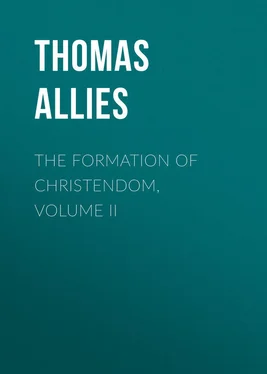Thomas Allies - The Formation of Christendom, Volume II
Здесь есть возможность читать онлайн «Thomas Allies - The Formation of Christendom, Volume II» — ознакомительный отрывок электронной книги совершенно бесплатно, а после прочтения отрывка купить полную версию. В некоторых случаях можно слушать аудио, скачать через торрент в формате fb2 и присутствует краткое содержание. Жанр: foreign_antique, foreign_prose, на английском языке. Описание произведения, (предисловие) а так же отзывы посетителей доступны на портале библиотеки ЛибКат.
- Название:The Formation of Christendom, Volume II
- Автор:
- Жанр:
- Год:неизвестен
- ISBN:нет данных
- Рейтинг книги:3 / 5. Голосов: 1
-
Избранное:Добавить в избранное
- Отзывы:
-
Ваша оценка:
- 60
- 1
- 2
- 3
- 4
- 5
The Formation of Christendom, Volume II: краткое содержание, описание и аннотация
Предлагаем к чтению аннотацию, описание, краткое содержание или предисловие (зависит от того, что написал сам автор книги «The Formation of Christendom, Volume II»). Если вы не нашли необходимую информацию о книге — напишите в комментариях, мы постараемся отыскать её.
The Formation of Christendom, Volume II — читать онлайн ознакомительный отрывок
Ниже представлен текст книги, разбитый по страницам. Система сохранения места последней прочитанной страницы, позволяет с удобством читать онлайн бесплатно книгу «The Formation of Christendom, Volume II», без необходимости каждый раз заново искать на чём Вы остановились. Поставьте закладку, и сможете в любой момент перейти на страницу, на которой закончили чтение.
Интервал:
Закладка:
The statements of our Lord and his apostles being so express and definite as to the existence of this diabolic kingdom, and as to the personal sway of a sovereign over it, let us look once more at this idolatry itself by the light thus shed upon it.
And first, whether we regard men as made to be members of a well-ordered society, enjoying temporal prosperity in this life, or as further intended for happiness in a future life, resulting from their present actions, 29 29 These two subjects occupy respectively the first five and the second five books of S. Augustine's City of God , where the argument is carried out in great detail.
the condition in which the heathen nations are actually found at our Lord's coming is quite unintelligible unless we suppose the reality of a diabolic power exercised upon them. The polytheism which we have witnessed holding all human life in its grasp, while it did not teach and uphold the great laws of morality, did, on the other hand, actively inculcate the violation of those laws by continually representing to the minds and eyes of men such a violation in the acts of the deities worshipped. It was a perpetual incitement of men to crimes, as well against social order as against all the sanctities of private life; it fostered the savageness of slavery, and the utmost cruelty in carrying on war, because its deities, being diverse for every nation, and belonging exclusively to the nation, had obliterated the idea that all men were of one blood, and thus delivered over the captive and the slave to the pitiless hatred or equally pitiless luxury of their fellow-men. So much for its action on human society as terminating with this life, while for a life to come it had no doctrine and made no preparation, but had suffered the earlier teaching of a future retribution to be considered as a fable fit for children and old women. Looking at such a condition of human society from the moral point of view, we may conclude with certainty that man would never, if left to himself, have devised it.
Secondly, regarding this polytheism as an object presented to the human intellect, nothing more unreasonable and monstrous than this crowd of deities can even be conceived. The human reason demands imperatively the unity of the godhead, since infinite power at least enters into the conception of the godhead, and to divide or limit infinity is an unreason. All the great works and order of the world bore witness likewise to this unity of the godhead, and were sufficient to prove it; 30 30 Rom. i. 20. See the Stoical argument for the unity of the deity in Cic. de Nat. Deor. 2.
and even in the worst times of paganism we find this proof exhibited with a force and lucidity to which even now little can be added. And in the worst times, again, we find the natural witness of the human soul breaking out in moments of sudden trial or great anguish, and calling upon the one God for help. 31 31 Tertullian de Testimonio Animæ , 2.
Yet in spite of this we see whole nations renowned for their intellectual productions, and men among them in whom the force of reason has rarely or never been surpassed, bowing their necks to this yoke of polytheism, and accepting this tissue of monstrous error, paying homage to it in their life, and dying with it on their lips; as Socrates offering the cock to Æsculapius, and Seneca the libation to Jove the liberator. We know not how to account for this, were man's reason left alone. We can see an adequate ground for it only in “men having been made unreasonable, and in the demoniacal error overshadowing the earth, and concealing the knowledge of the true God.” 32 32 Οὔτω τοίνυν ἀλογωθέντων τῶν ἀνθρώπων, καὶ οὕτω τῆς δαιμονικῆς πλάνης ἐπισκιαζούσης τὰ πανταχοῦ, καὶ κρυπτούσης τὴν περὶ τοῦ ἀληθινοῦ Θεοῦ γνῶσιν. S. Athan. de Incar. 13.
Let us take a third view of it, neither the moral nor the logical, but the view of it as an existing fact, as something which for many hundred years occupied the earth, ruled nations, moulded the institutions and characters of men. Here we do not speak merely of the multitude of temples, of priests or priestesses serving in them, of sacrifices offered by these, of prayers, vows, festivals in honour of the gods – because all these enter into the notion of a service rendered by man to the power superior to him, and in their utmost perversion there is nothing which may not be accounted for by a simply human corruption stealing into and spoiling an originally good institution; but all these in the actual condition of paganism were mixed up with and penetrated by other elements, and accompanied by effects not to be so accounted for. Let us take the universal persuasion that the statues of the gods were inhabited by the deities which they represented, as bodies by souls. 33 33 See S. August. de Civ. Dei , viii. 24. “Immundi spiritus, eisdem simulacris arte illa nefaria colligati, cultorum suorum animas in suam societatem redigendo miserabiliter captivaverant.”
Here was the notion of a spiritual power taking possession of material forms. But how was this notion introduced, propagated, and maintained in men's minds? By certain visible and palpable effects, 34 34 Called by S. Athan. ἡ τῶν δαιμόνων ἀπάτη – μανία – φαντασίαι. Thus De Inc. 47. πάλαι μὲν δαίμονες ἐφαντασιασκόπουν τοὺς ἀνθρώπους. προκαταλαμβάνοντες πηγὰς ἢ ποταμοὺς, ἢ ξύλα, ἢ λίθους, καὶ οὕτω ταῖς μαγγανείαις ἐξέπληττον τοὺς ἄφρονας. Νῦν δὲ τῆς θείας ἐπιφανείας τοῦ Λόγου γεγενημένης. πέπαυται τούτων ἡ φαντασία.
of which those who were eye-witnesses give us many details. Take again the oracles which existed throughout the heathen world, and, as dealing with the same subject-matter, divination in all its forms. However much of deceit there might be here, was there not also, in many instances, an exhibition of power and knowledge beyond that of man, which no mere deceit could produce? Take again magic, the invocation, adjuration, and compacting with spirits, which ran through heathen society in numberless shapes; and take lastly the fact of spirits seizing upon and possessing the bodies of men, speaking by their voice, and controlling their minds. The four classes which we have just given comprehend in themselves an innumerable multitude of facts which are apparent in pagan history, in all which the corruption of the human soul is an agent or patient, but for which that corruption by itself supplies no adequate cause. A spiritual power is behind, laying hold of and acting upon this corruption, and by fault of the human will making an inroad into the visible world, and partially mastering it, bending it to an evil purpose, and making it serve as an agent to man's captivity. Let us briefly cite as to the reality of this spiritual power the witness of its victims and the witness of its opponents.
First, as to its victims. Scarcely a writer, whether poet, historian, philosopher, or biographer, can be found among the heathens of Greece and Rome who does not attest facts belonging to one or more of these four classes which surpass human power, and suggest an invisible spiritual agency. The poet who writes expressly to deny such an agency speaks of the whole world as bowed beneath the fear of it; another poet, 35 35 “Humana ante oculos fœde quam vita jaceretIn terris, oppressa gravi sub religione,” &c. Lucret. i. 63. “Felix qui potuit rerum cognoscere causas, Atque metus omnes et inexorabile fatum Subjecit pedibus, strepitumque Acherontis avari.” Virg. Geo. ii. 491.
referring tacitly to this very passage, felicitates the man not who has a pure conscience, but who through knowledge of natural things has trampled these fears under his feet. Nor is such a belief confined to the vulgar; but scarcely a man of eminence, a soldier, or a statesman can be cited who does not in his life and actions acknowledge it, shrink from it, or cower beneath it. It is too powerful for Alexander or even Julius to escape; and the philosophers who affect to deny it in their systems exhibit it in their conduct. They have all the conviction of an evil power beyond and above nature, but taking hold of natural forms, and ever lying in wait to burst forth from them upon human life. The Greek name for superstition is fear of the demons; and what S. Paul said of the Athenians, that he found them in all things too fearful of the demons, might be applied to the whole circle of nations surrounding the midland sea.
Интервал:
Закладка:
Похожие книги на «The Formation of Christendom, Volume II»
Представляем Вашему вниманию похожие книги на «The Formation of Christendom, Volume II» списком для выбора. Мы отобрали схожую по названию и смыслу литературу в надежде предоставить читателям больше вариантов отыскать новые, интересные, ещё непрочитанные произведения.
Обсуждение, отзывы о книге «The Formation of Christendom, Volume II» и просто собственные мнения читателей. Оставьте ваши комментарии, напишите, что Вы думаете о произведении, его смысле или главных героях. Укажите что конкретно понравилось, а что нет, и почему Вы так считаете.












